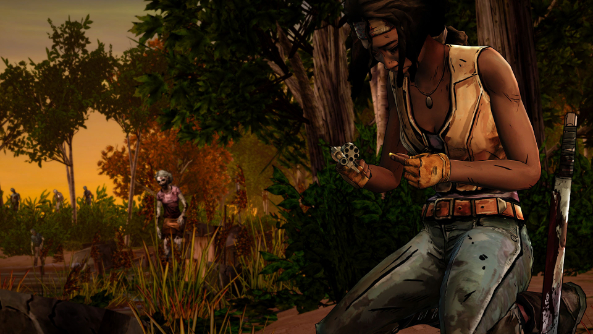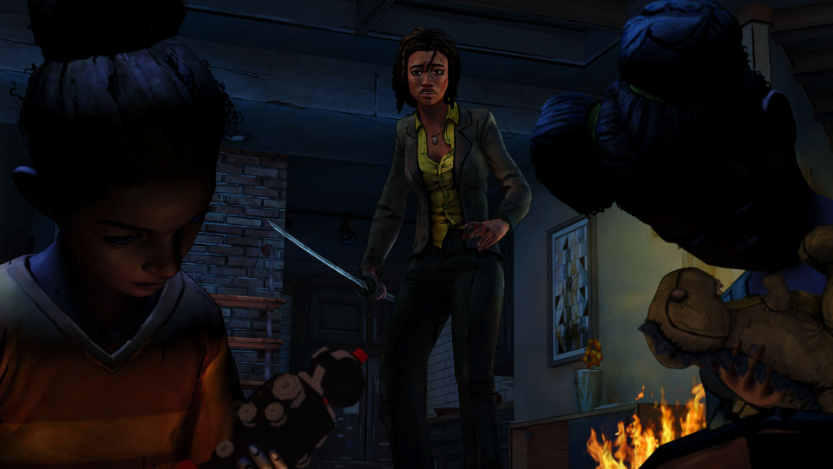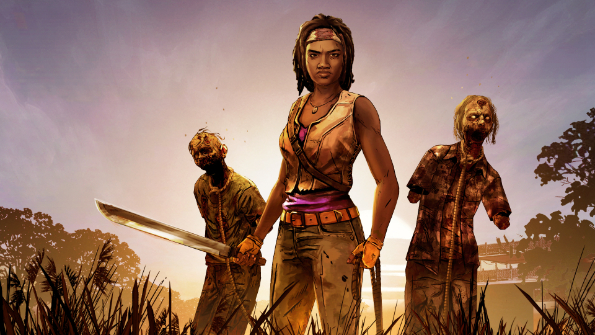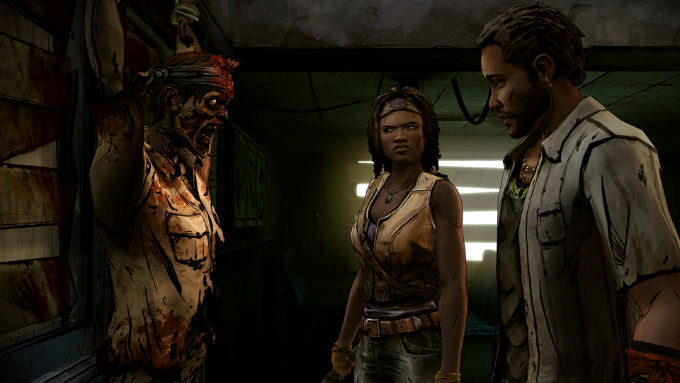Returning to the famed franchise that saw Telltale Games propelled into the forefront of narrative-driven adventure games, The Walking Dead: Michonne is a brand new mini-series focussed on the titular character. Appearing heavily within the comic book source material and the TV show, some players will of course already be familiar with Michonne’s character from the very beginning; however, the game comfortably introduces this well established character to players that are not invested in The Walking Dead universe, such as myself. After spending 2 hours or so with her during the course of the first episode, I can safely say that she has plenty to provide the Telltale franchise.
Untrusting, mysterious, dealing with loss, and, as a result, mentally unstable – there are layers there that are ripe for the picking that add a welcome shot in the arm to the character-based interaction. This mental instability in particular is what separates Michonne from the likes of Lee and Clementine before her, but similarly, she continues the trend of being both a strong and interesting protagonist. Part of the driving force that makes her particularly compelling is found within her haunting past, a quality that sticks around long enough to tease, but opts to keep its cards close to its chest in order to maintain the air of mystery early on. While it could be argued that this aspect is underplayed considering its huge focus in the opening scene, it’s clear that there’s a lot to come, and the future episodes should begin to reveal some answers. PTSD is something that hasn’t really been explored within The Walking Dead games before – at least not to such an extent – and it adds a breath of fresh air amongst an otherwise air of familiarity.
Bringing me towards the issue with this spin-off series – and recent Telltale releases, in my opinion – fundamentally speaking, this game just doesn’t feel like anything new. You’ll experience the same point-and-click lite gameplay and uninspired QTE filled actions that once felt fresh 4 years ago, but have long-since past their ‘best before’ date. Coming across as stale and bland, the core mechanics are in desperate need of reinvention and struggle to even evoke the slightest thrill, despite how action-packed and tense the on-screen action might be. Sure, the ‘action’ gameplay looks stylish and has had some slight improvements made to it in the form of new ways to interact, but it’s tired. Forced to initiate the most unnecessary of tasks that could have otherwise been scripted, recycling the limited selection of button prompts each time, and mashing the same buttons for the same kinds of actions – the rest of the game unfortunately follows in the same repetitious footsteps, albeit without the same level of drudgery.
“Been there, done that” can’t help but be brought to mind as you play through and encounter familiar plot beats, familiar villains, and the usual heavy dose of walker and crazed survivor conflict. Solid voice work, good directing, and an interesting lead character ultimately results in something entertaining, but this entry in the franchise feels almost formulaic and predictable. The general plot isn’t anything particularly special or new (though it certainly isn’t uninspired), and with a large amount of decisions that haven’t shown much immediate consequence, it’s hard to say how significant certain choices are. Though the locations and the majority of the characters are very much unique to this title, the structure of the key events leaves the impression that you’ve experienced them several times before. The aforementioned villains specifically lack the memorable edge that previous titles had captured, with the ones presented here feeling like Frankenstein creations of characters that have been and gone. Throwing around the word once more, the feeling of familiarity dampens the ensuing conflict and tension. The pacing, however, is spot-on and does a good job of improving upon the episode as a whole. Though moments of long loading screens and cuts to black break the immersion at times, the general flow from start to finish is strong. Perhaps because of the mini-series format, this episode benefits greatly from feeling more focussed and concise.
While improvements haven’t really been made in the areas that needed it the most, the visual presentation of this title marks a significant improvement over its predecessors, and a Telltale game has never looked better. Animations in particular are now fluid where they once had all the elegance of a Thunderbird’s puppet, textures and models looks more detailed than they ever have done, camera framing is more creative and interesting as a whole, button prompts are now styled to fit into the environment so they look more cohesive, black bars are introduced during action scenes to make things more cinematic, and more subtle visual flourishes such as depth of field add extra spice.
Following on from such strong and well-received releases, the expectations were high for this spin-off, and rightly so. While this series appears to bring nothing revolutionary to the table, it is still entertaining despite the feeling of déjà vu, and the lack of ambition. Overly familiar and containing the same overused gameplay, Michonne herself is the saving grace of this title thus far. Though it was by far interesting enough to hold my attention until the credits rolled, and admittedly it builds up some excitement for what is to come despite a somewhat flat cliff-hanger – the next episode will need to hit the ground running, and the series as a whole must unleash its potential in order for it to leave a lasting impression.














You must be logged in to post a comment.